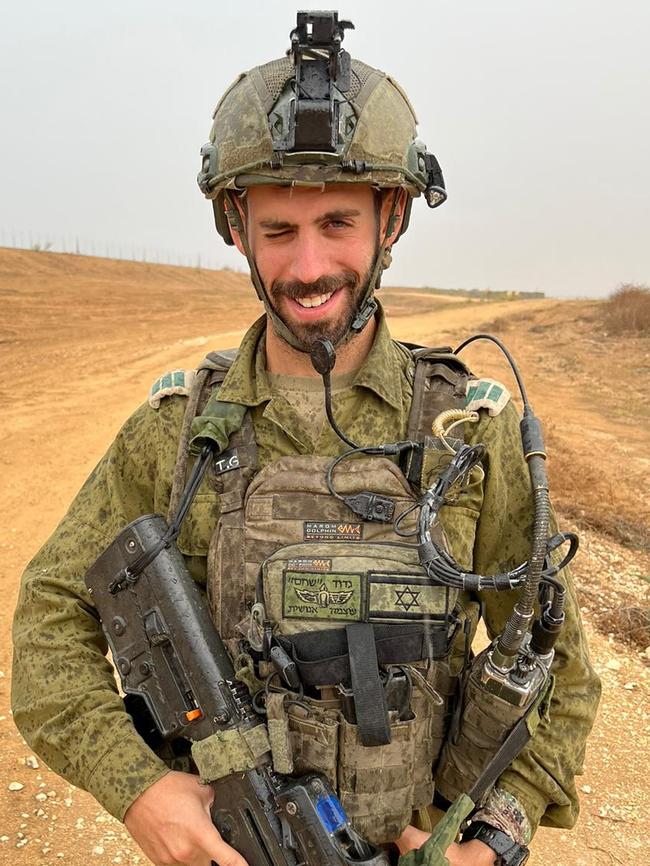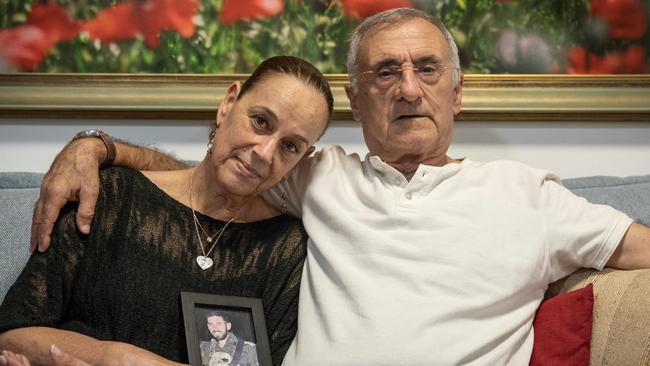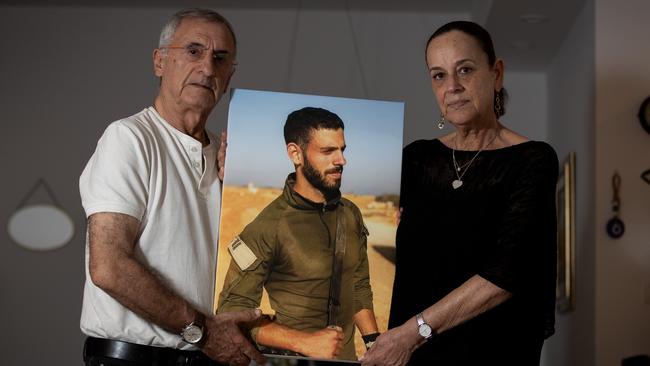The warrior poet is a hallowed figure in Israeli society, a deeply masculine society but one that reveres the rare and thoughtful soldier who serves for higher purposes than mere mission objectives and blood split on the battlefield.
What are these higher purposes? To a soldier such as Tal Grushka, a 25-year-old company commander killed on October 7, it was a vision of Israel as a safe haven for Jews, at peace with its neighbours through the competence of its own security.
“Only together can we ensure quiet for the citizens of the state of Israel,” he once wrote in a message to fellow soldiers.
Grushka idolised the Israeli military, but not because he wanted to resettle Gaza. He didn’t dream of land grabs in Lebanon and Syria, and he didn’t harbour animosity towards ordinary Palestinians.
Soldiers under his command were moulded to impeccable standards of infield conduct. When they searched a house in the West Bank, Grushka would order his men to complete their objectives and then restore every object they handled to just the way it had been found.
His instructions went beyond the field, too. Every Friday, without question, his soldiers were directed to take out their mobile phones, contact their grandparents ahead of the weekend and wish them Shabbat Shalom. Not their mates; their elders.

Grushka didn’t do this to achieve an edge in combat. He did it because he understood that a fundamental determinant of Israel’s identity and place in the world – seemingly tested more than any other nation – lay in how its soldiers demonstrated their values, their humanity.
And for him, the existence of Israel was non-negotiable. It remained the last line of defence for a persecuted Jewish people whose enemies had sought their annihilation since the days of antiquity: from the Babylonians and the Romans to the expulsions from England and Spain in the Middle Ages, to the pogroms of the 1800s and the Holocaust last century.
“All of these are a painful testimony to our need for a free and independent country as a home to the Jewish people,” he said, going on to quote a line as familiar to Israelis as the date of their own birthday. “We have no other country.”
But what would Grushka say now, one year on from the Hamas infiltrations that ended his life on October 7?
As thousands of rockets were launched from Gaza that morning, he and seven soldiers were dispatched from their base near Jerusalem to the city of Sderot, which was under attack and required the evacuation of a synagogue. That mission complete, they proceeded to the village of Kfar Aza, encountering hellfire from a tree line on the side of the highway. Five terrorists had hidden for an ambush carrying “a lot of guns and fire, a lot of ammunition”, said Tal’s mother Adva.
She and her husband Yossi visited that scene for the first time a week ago, escorted by a soldier who participated in the battle. Aged just 21, he told them that Grushka stopped the car amid the bullets, ordered his men to fall back and repeatedly engaged the terrorists with cover fire to help his troops take up positions. “He stayed in the car,” Adva said, describing how the fatal bullet hit him in an area of his torso not protected by the bulletproof vest.

A refrain used too often in Israel nowadays is that no one can remember what life was like before the massacres, so consumed and beaten-down has everyone become by rolling tragedies. What began on October 7 with a large-scale loss of life and the kidnapping of hostages has been compounded by daily rushes to the bomb shelters and a full-scale war in Gaza, just as now, it would appear, a ground incursion has begun in Lebanon.
The country holds its breath, then feels sick, when the army releases the name of another baby-faced soldier given up to the machinery that assures the state of its peace and security.
And just as shattered is the once-unshakeable belief in the talents and abilities of the Israeli security services (propped up more recently, as they have been, by successful operations abroad). Not just because of their flat-footed response to the events of October 7, but because more than 100 hostages still languish in Gaza without a deal to secure freedom. A sweeping defence establishment might still be in overdrive trying to get them out, but people can’t help but draw a message – and a wake up call – from the political class. That is, you might be willing to sacrifice everything for the country, but its leadership won’t always reciprocate.
Grushka was a soldier of unflinching belief in this social contract, and he would probably reject this depressing sentiment because he understood that Israel survived because it lived as a warrior state, that its sliver of land, its desert and mountains, hinged entirely on the commitment of its youth to a mission of survival.
It’s a lesson that a generation of people born after the Holocaust have never had to contend with but are now grasping hard in the lengthening shadows of October 7. Rallying the youth in the old days was achieved in part through tales of daring commanders placed in no-win scenarios, but who succeeded regardless.
Pop culture helped, of course. Some of Israel’s most enduring songs were sketched from stories of military service, the lyrics speaking not of slain villains and victory but of tender souls wistful in their longing to be out of uniform again, living peacefully, without arms.
“But I’m a soldier, and don’t you cry for me, girl,” goes Shlomo Artzi’s Song of a Soldier, the lyrics of which were drawn from letters sent by a Nimrod Gaon to his girlfriend, in the 1970s, in which he accepted his duty but craved the privileges of ordinary life – a Janis Joplin record, the stories of Anton Chekhov, the “shivers of pleasure” he remembered from the sounds of a string quartet.
The modern equivalent of enlistment hype sees high-school students reared on television commercials of soldiers crawling through barbed wire for the infantry brigades, or holding up a flag for the armoured tank corp. And there are, of course, great heapings of cachet to be drawn from serving with distinction in the IDF.
Israel is a society that thrives on tests of masculinity, the fringe benefits of which are obvious: words such as “Egoz” or “Duvdevan” on a soldier’s resume – both storeyed special forces units – are enough to ensure at least a foot in the door in most industries once their service is complete.
But the other bitter lesson dredged up by October 7 concerns the caprice and shifting loyalties of once iron-clad allies – Australia among them – appearing to turn their backs on the Jewish state for political expediency.
Confusion reigns, and why not? World leaders are lining up to equivocate (at best) and condemn (at worst) Israel’s right to fend off a multi-front war against jihadists who keep promising, quite literally, to commit another wipe-out of Jews if they’re given the opportunity. What’s the takeaway for the man or woman in the street when even Anthony Albanese and his government can’t bring themselves to wholly reject the despicably dishonest allegation, levelled in the International Court of Justice, that Israel has committed genocide in Gaza?
This while Israelis have spent the past 12 months running to bomb shelters because of Hezbollah rockets launched from southern Lebanon, and from Iranian-sponsored militias in Syria and Iraq. And being warned of drone attacks originating from Yemen. And ducking for cover from ballistic missiles launched by Iran itself, nearly 200 of them fired at Tel Aviv last week plus another 300 or so in April.
The world waits for Israel’s response, those plans drawn up as the country prepares to hold its October 7 memorial services. Even this, what should be a straightforward occasion, is shaping as a messy affair, with official and unofficial events competing with each other and the families of some hostages threatening to boycott the formal ceremony.
But Israelis are used to being demonised as deserving of their own troubles. It’s happened so often, and for so long, that jokes best capture the irony of the world’s cynical and morally inverted position.
Perhaps you’ve already heard about the Englishman, the American and the Israeli captured by a cannibal tribe in Africa? Granted a final wish, the Brit requested a whisky and pipe, the American a delicious steak. Each received their wish. The Israeli asked the tribal chief to kick him in the backside, a request that the chief refused. An argument ensued and finally the chief relented, at which point the Israeli pulled a gun and shot all the cannibals dead.
“I don’t get it,” said the American. “If you had a gun the whole time, why didn’t you kill them sooner?”
“Are you crazy,” the Israeli replied, “and have the UN call me the aggressor?”
This is not a joke told amid the current crisis of 2024 (although it’s applicable) but was in a letter written by Jonathan Netanyahu, brother of the Israeli Prime Minister, on the eve of the 1967 Six-Day War, when Syrians, Egyptians and Jordanians telegraphed their intention to annihilate Israel and mass graves were dug up around Tel Aviv and Jerusalem to prepare for the expected body count.
Not only did a pre-emptive strike by Israel end up averting a catastrophe, but it ended Jordan’s occupation of East Jerusalem and the West Bank, the Israelis capturing swathes of territory during the ensuing battles. You might think that taking possession of this land would ruin attempts to achieve peace with those countries, but two – Egypt and Jordan – have kept lasting treaties with Israel for decades: Egypt since 1979 and Jordan since 1994.
“If someone comes to kill you, rise up and kill him first,” goes the line from the Talmud, a precept that Ronen Bergman used as the title of his book detailing a history of Israel’s targeted killing operations, carried out by its clandestine services branch, Mossad.
Hence the pager and walkie-talkie attacks in Lebanon, the air strikes that killed Hezbollah leader Hassan Nasrallah and his hierarchy of terrorist thugs, all of whom were planning, according to the IDF, to replicate the October 7 massacres with similar infiltrations of northern Israel. It’s for this reason the IDF has opened a front on its northern border with Lebanon, and why Israelis buried nearly a dozen of its cherished children last week who were killed in the ensuing battles.
We know what Grushka would be thinking if he were alive today, and in some respects we can also know what he would be doing. It’s easy to picture him on the frontline of these battles, either in Gaza or in Lebanon, telling his troops to call their grandparents, or reminding them of what they’re doing, of his vision for the future of this country – of peace, achieved through strength.
It’s the only language anyone speaks fluently in this hostile neighbourhood.



More Coverage
Add your comment to this story
To join the conversation, please log in. Don't have an account? Register
Join the conversation, you are commenting as Logout